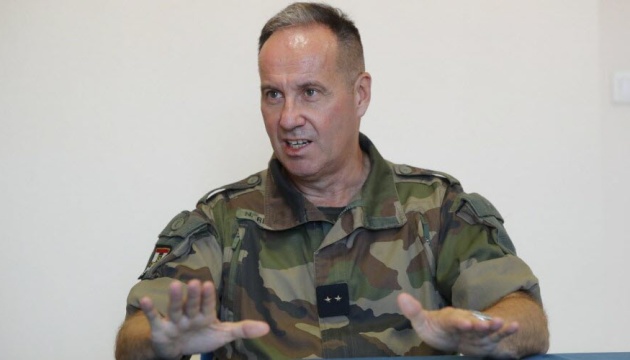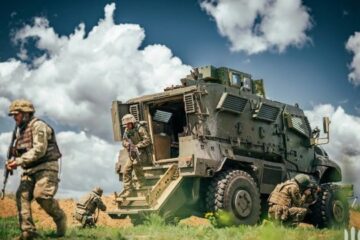
Over the years of war, Ukrainians have become experts in deep defense combat, making any potential Russian offensive unlikely to succeed. At the same time, neither side currently has the capacity to execute a major breakthrough.
French Army General Nicolas Richoux told this to a Ukrinform correspondent.
“Since 2023, the frontlines have become increasingly fortified. And above all, the Ukrainians have become specialists in deep battle – in slowing down the enemy. When you can’t gain the upper hand and are forced to retreat, you inflict maximum losses,” Richou explains.
In his view, achieving a breakthrough in this “war of attrition,” with its multiple solid defensive lines, will be extremely difficult.
“That’s why I don’t believe that a likely Russian offensive – which, judging by current signs, may come in 2025 – will be successful. For instance, for them to reach Kharkiv. They simply don’t have the mass. So the probability of success is low, although the risk would be enormous if it somehow happened,” the general says.
Richoux draws comparisons with World War I, when multi-million-strong armies faced off on both sides of the front.
“From 1914 to 1918, the front stretched about 800 kilometers from the North Sea to Alsace. On that front, we probably had 5 to 7 million French soldiers, with a similar number on the opposing side. Today, across a 1,200 km front, Ukraine has about 900,000 troops, and probably the same number on the Russian side. But this kind of dispersion prevents the concentration of forces. For a breakthrough, you need two echelons: the first opens the door but quickly gets exhausted, and the second must rush in and pursue.”
Currently, neither side can amass the necessary volume of tanks, troops, ammunition, or logistics support to carry out such an operation, he says.
“Russia’s industrial capacity is indeed growing, but it is heavily supported by North Korea and Iran. On the other side, Ukraine is also growing stronger, receiving substantial aid from the West — from Europeans and also Americans, who haven’t backed away yet. This creates a sort of balance of power, slightly tilting toward Russia, which must be acknowledged,” says the general.
He also points out that both Russia and Ukraine are facing manpower shortages.
“So even if Ukraine were to receive tanks and equipment tomorrow, there remains the challenge of staffing this hardware with tens of thousands of troops. Even with the equipment, you still need manpower. And when it comes to manpower, remember: battles are won on the ground. At some point, you have to take the ground. And if you don’t have mass on the ground, it’s difficult. Clearly, this is a shared problem — the Russians face it too. Even they can’t pull it off, and they have a population of 140 million.”
Despite these challenges, Richoux acknowledges that since the full-scale invasion, the Russian army has learned a lot — particularly in drone warfare, now operating at nearly the same level as Ukraine.
“Yes, they’ve learned. But on a tactical level, I’m still a bit struck by their scattered efforts — micro-attacks over centimeters of the front, trying to capture a few square kilometers, as if they can’t decide which part of Ukraine they want to take first. Tactically, it’s still a frontal bloodbath, like in 1914–18. There’s no revolutionary thinking. Ultimately, freedom of action is a key principle of warfare, and they struggle with it — even though Russia is three times larger by population and wealth, they are unable to defeat Ukraine. Ukraine, to be blunt, is holding its ground.”
As reported earlier, General Richoux believes a ceasefire could be possible this year — but only if Ukraine receives massive military aid. Putin, he warns, has no intention of stopping until he reaches the administrative borders of all the Ukrainian regions that Russia has claimed in its Constitution.
Source: Chances of Russian successful breakthrough low – French General Richoux



